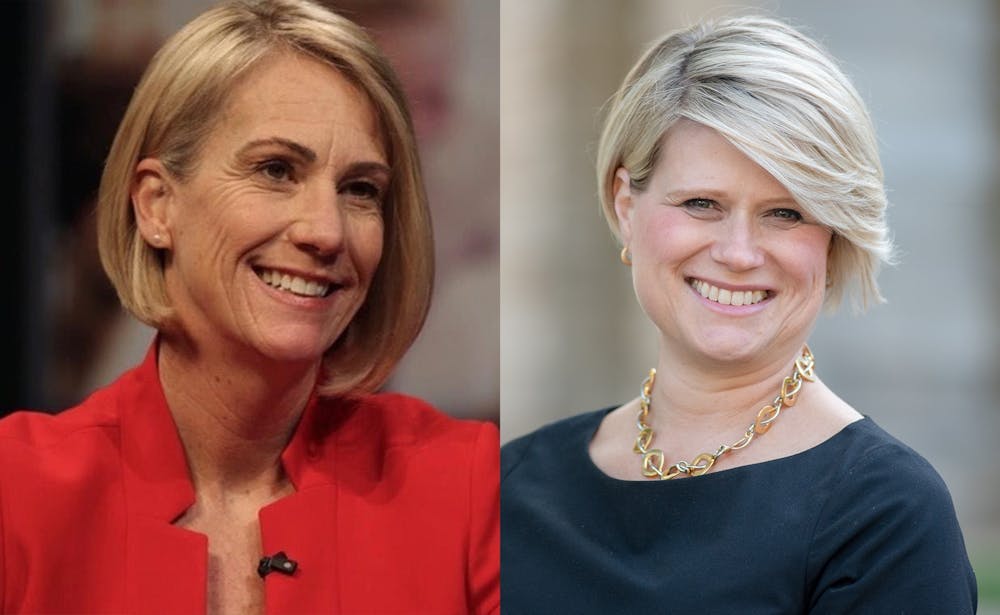Truitt said social workers, school nurses, school psychologists and school resource officers need more funding. Along with more funding, Truitt said there are not enough qualified people in the state to be in these positions, especially in rural counties.
“We’re going to have to get creative about ways that we can ensure that the students who live in these low-income districts are being served,” Truitt said. “I think telehealth is a great example of a way to do that.”
Student debt
Mangrum said she would like to expand the state's Teaching Fellows program to more schools throughout North Carolina, especially to HBCUs. The Teaching Fellows program gives students opportunities for funding and loan forgiveness to become teachers.
“Teaching Fellows would be a great way to keep the debt from overcoming people that want to be teachers and commit to North Carolina,” Mangrum said.
Truitt is chancellor at Western Governors University North Carolina, a non-profit online university that she said has been noted for its innovation and disruption to higher education. She said the same innovation and disruption has to occur with traditional brick and mortar universities.
“Free college sounds like a great idea, but it does nothing to lower the cost of a college education, which has skyrocketed in the last 20 years,” Truitt said.
Truitt said North Carolina spends more on the residential pieces, like housing, of a four-year education than on teaching, and she is not a fan of that. She said North Carolina needs to rethink how post-secondary education is priced and how it is delivered.
Civil rights
Mangrum said we need to start looking at identifiers in the system that create opportunity gaps between children of color and their white peers. She also wants to figure out ways to recruit more teachers of color in North Carolina and to create more opportunity for growth and leadership.
Mangrum said her cabinet will be diverse so it is not limited in its perspectives.
Truitt said the biggest civil rights issue is the state’s inability to ensure that students of color are learning how to read by the time they’re in third grade. She also said there is a 30 point achievement gap between low-income students and their wealthier counterparts — a statistic that hasn't been moved for over 30 years.
To get the day's news and headlines in your inbox each morning, sign up for our email newsletters.
“We need leadership that’s going to ask the question, ‘What do we need to be doing differently in order to see different outcomes for students who have clearly been underserved?’,” Truitt said.
Truitt wants to launch a statewide reading campaign that is grounded in the science of reading, and to make sure all counties are offering career technical education pathways and credentials that are aligned to workforce needs.
Wages/labor
Mangrum said she would like to get North Carolina to the top of the states for teacher pay. She said North Carolina needs to start supporting its teachers and to give teachers appropriate pay for their master's degrees.
Truitt also wants to raise teacher pay for all teachers, especially veteran teachers who are not getting the pay raises she said they deserve.
LGBTQ+ rights and policies
Mangrum said she is committed to having an Office of Equity Affairs at the Department of Public Instruction to address issues of racism and protect vulnerable populations such as members of the LGBTQ+ community in schools.
“We’re going to protect children and their names and their identity,” Mangrum said. “Children should have the ability to choose that.”
Truitt said there are laws that protect LGBTQ+ students in public education and higher education that need to be followed. She said local superintendents are responsible for ensuring these laws are protecting LGBTQ+ students within their districts.
“Local superintendents are responsible for creating a climate in which students are treated equitably, fairly, with honor and grace and respect,” Truitt said. “That is, as state superintendent, the culture I will create in the workspace that I am responsible for, and I would expect nothing less from our local superintendents."
@BritneyCath
@onevotenc
@DTHCityState | city@dailytarheel.com



